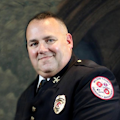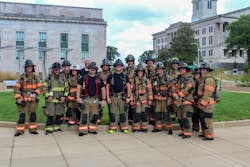For as long as I can remember, the fire service profession has been built on a strong sense of tradition and camaraderie. That said, who reading this noticed the generational gap that’s between the veterans and the newer generations getting larger? I know that I have. Our firehouses today comprise multiple generations, from baby boomers to Gen X, to millennials, to Gen Z.
With all of these age groups, there’s bound to be some headbutting, but there isn’t anything that we can do about that. However, it would benefit us all to remember that each generation has a unique set of values, experiences and expectations.
Age differences can lead to numerous different issues, such as communication breakdowns, misunderstandings and conflicts. For our services to grow, we—young and old—must make bridging these generational gaps a priority.
Mentorship
One of the ways that we can bridge generational gaps is by creating mentorship opportunities. As a department, finding out ahead of time, prior to hiring, who is available to and who is interested in mentoring new employees is key.
We all know that there are members who we don’t want around new personnel. Every department has them. We wish that we could change that, but it isn’t going to happen overnight. Rome wasn’t built in a day, as they say. Changing culture takes time.
We must remember that mentors shouldn’t be assigned. Being a mentor is a choice. Furthermore, mentorship can’t be arranged by pairing new personnel with just any senior member. Officers must be aware of their surroundings and take note of whose personalities connect with whose.
The bottom line is that new people will learn the ropes faster with someone who they look up to and when personalities click. Imagine being required to learn in an environment where you have nothing in common with someone. We can do better than that.
Open communication
Another vital strategy for bridging generational gaps in the fire service is to foster open communication. Yes, I said it! We must communicate with each other, and, yes, this also means that older folks must be willing to communicate with younger folks.
Newer firefighters: You must know how to communicate with older firefighters, too. Many misunderstandings stem from lack of communication.
What makes us believe that there won’t be misunderstandings between generations if we don’t communicate effectively?
That said, we also must have an open mind. Now, I’m not saying that we must fix something that isn’t broken. However, younger personnel might have fresh ideas or might have learned a way to complete a task that older members didn’t learn yet. Younger members must have the opportunity to communicate that and not have someone breathing the old saying, “This is the way we always did it.” Those days are over.
By encouraging open dialogue, everyone can learn from one another and work together to improve our service.
Stereotyping
We have all been in a situation where we believe that our age or our seniority takes priority. You can admit it. I am guilty of it myself. We all are.
We have taken too many steps forward in the fire service to believe for one second that there isn’t a better way to do a task. This isn’t to say that a suggested way is going to be better, but the point is to take a second, listen to a suggestion and react to it with an open mind.
Our newest recruitment class is a testament to this. They have single-handedly started a change in our culture. Our shorthanded crews have worked long and hard lately.
When recruits came to my department’s stations, a majority of our personnel jumped on board. I’ve seen our older personnel learn new skills and train with these recruits every day. After all, what’s it going to hurt to try a task or skill in a different way if we are safe with it?
News flash: People work better when they believe that their voice is heard.
Variety of communication
Like it or not, youth today is way more technologically inclined than older folks will ever think about being. The younger generation tends to communicate more through text, email and social media.
My department has seen a huge rise in the number of younger applicants. Our youngest employee is 19 years old. (We recently changed our minimum age requirement because of lack of staffing.)
Both older and younger generations in the fire service must be aware that communication techniques are quite different. My department had a crash course in this the past few months, and we are better because of it.
Everyone must make that extra effort to learn each other’s ways. If you are older in the fire service and don’t know about email (yes, there are some still out there), you might want to learn. Technology is here and not going anywhere.
Younger folks, be aware that older members would rather communicate face to face. Make that extra effort to talk and learn face-to-face communication skills. They’re valuable skills to have. After all, the fire service is customer-based, and we must have the people skills to excel.
Success or failure
Bridging generational gaps in the fire service is crucial for ensuring that the service continues to thrive. Establishing mentorship programs and promoting discussion can help to keep the lines of communication open between different generations of firefighters. This requires all generations to adapt.
Ultimately, by fostering a sense of mutual respect and collaboration among all members, the fire service can continue to be a respected, effective profession for years to come. Otherwise, we can choose to not communicate, to exclude the younger generation and watch our traditions fade.
The choice is ours.
About the Author

Eric Eldridge
Eric Eldridge is a 25-year veteran of the fire service. He currently is a captain at Wilson County, TN, Emergency Management Agency, which provides comprehensive fire, rescue, EMS and special operations services. He holds a bachelor’s degree in fire administration and investigation and is nearing completion of a master’s degree.
